Russian network used BuzzFeed's Community site to spread false news stories
- Published
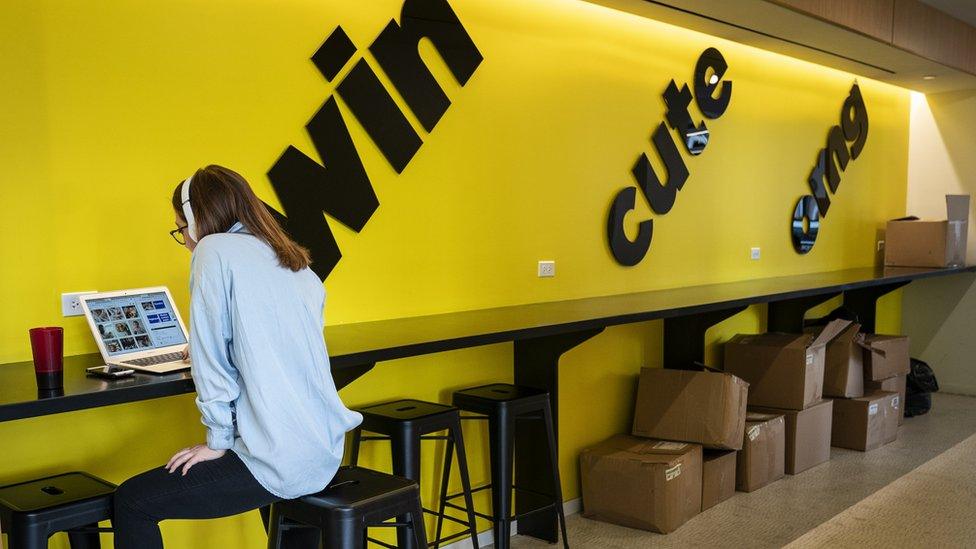
A network of social media accounts connected to a leak of US-UK trade documents has also spread false news stories online, a BBC investigation has discovered.
The accounts, which have been linked to Russia, used the community section of BuzzFeed and other open-access websites to publish and promote fake stories, highly partisan content and conspiracy theories.
BuzzFeed and the question-and-answer website Quora have removed some material after they were approached by the BBC.
The leak
The network's activity became an issue during the general election, after leaked US-UK trade documents were posted on discussion website Reddit.
Less than a week before the vote, Reddit announced that the accounts and the leak - which was highlighted during the campaign by Labour Party leader Jeremy Corbyn - were linked to Russia.
Reddit did not give details of the evidence, nor did it definitively state that the Russian government directed or sponsored the network, which was first uncovered earlier in the year by researchers at Oxford and Cardiff universities, the Atlantic Council think tank and social media analysis firm Graphika.
In a post, Reddit said a group of 61 suspect accounts "provides us with important attribution for the recent posting of the leaked UK documents, as well as insights into how adversaries are adapting their tactics".
On Tuesday, Graphika published a follow-up report, external and said it had identified 44 stories posted by the Russian network between October 2016 and October 2019.
Most of the stories pushed by the network online appear to be false or highly partisan. The leaked trade talk documents, by contrast, appear to be genuine.
How we know
In a post on 6 December titled Suspected Campaign from Russia on Reddit, external, the site released the full list of now-suspended accounts which it said were part of a co-ordinated effort.
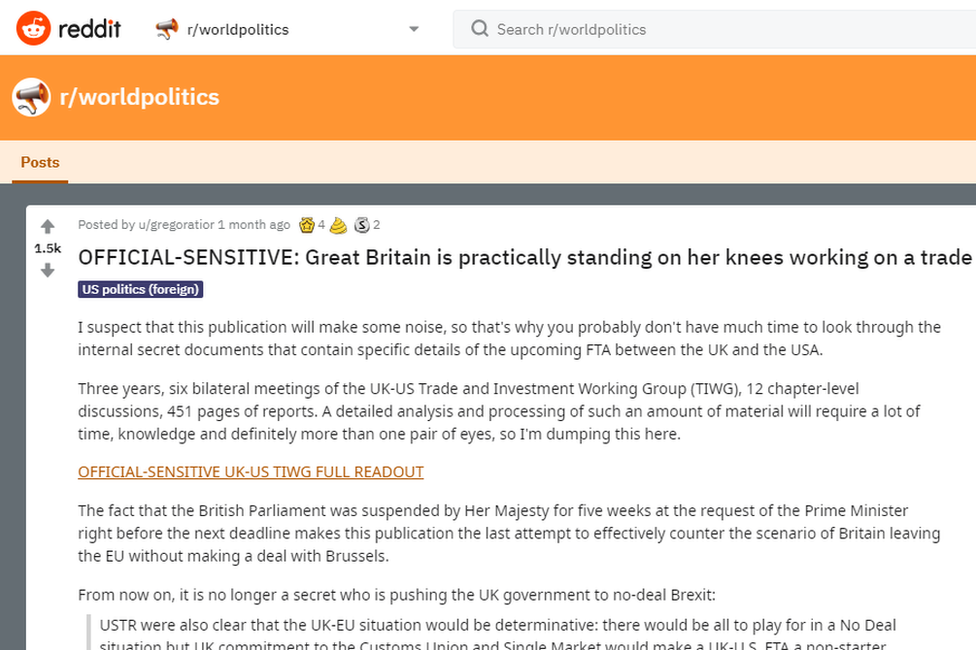
The leaked documents were posted on Reddit
BBC Trending examined those accounts and the material they posted in detail, tracing them to other accounts and posts on BuzzFeed, blogging site Medium, question-and-answer site Quora and a host of lesser-known blogs and sites.
In some cases, posts by the suspended accounts on Reddit were copied, word for word and almost simultaneously, on other sites. In other cases, unique user names or email addresses were the same.
BuzzFeed's Community section, which is separate from the professionally staffed BuzzFeed News, is written by unpaid volunteers and is more commonly known as a source of the site's popular quizzes and jokey listicles.
The stories in the Community section appear with BuzzFeed logos and branding, but carry a disclaimer at the top: "This post has not been vetted or endorsed by BuzzFeed's editorial staff."
The BBC found several examples of accounts linked to the Russian network posting false news stories on BuzzFeed Community.
One of the Russia-linked Reddit accounts posted a scathing assessment of relations between Germany and Turkey. Within minutes, the same post appeared on BuzzFeed Community.
In an another example, one that included false material, a BuzzFeed Community article - posted by an account called "OliverrStonne" - pretended to be an exclusive interview with a member of Britain's MI6 secret service.
The agent, whose name was given as "Richard Jones", supposedly claimed that MI6 had secretly worked to prevent the election of US President Donald Trump, on the orders of former British Prime Minister David Cameron and Democratic Party candidate Hillary Clinton.
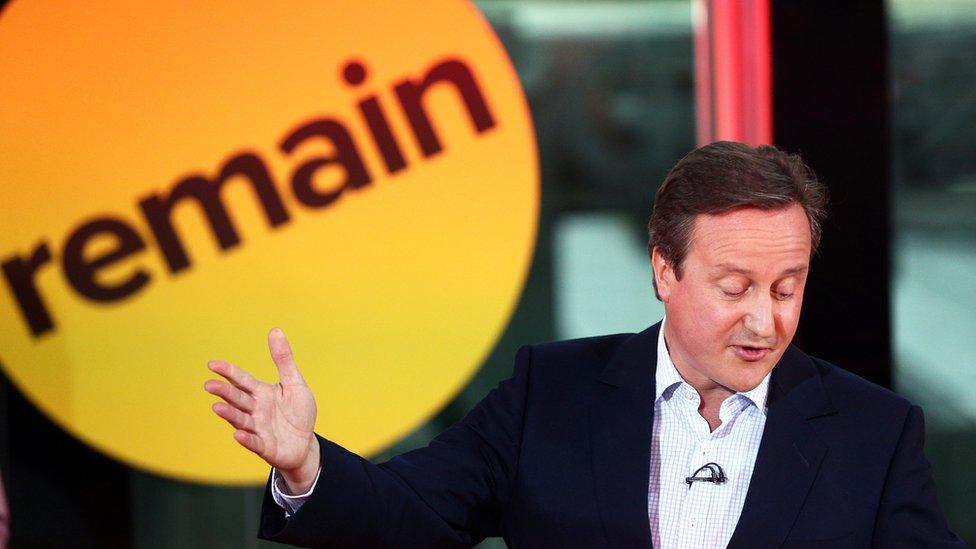
Former Prime Minister David Cameron at a BuzzFeed-sponsored EU referendum debate in 2016
Made-up story
Leaving aside the far-fetched idea that a member of Britain's intelligence services would have give an on-the-record interview to a pseudonymous volunteer writer, the interview itself spun several bizarre conspiracy theories. It claimed, for example that Mr Cameron was secretly in favour of Brexit (he campaigned against it).
The post, like most of the content produced by the Russian network, received very little attention.
BuzzFeed said the post was viewed 522 times, and a link to the article does not appear to have been publicly posted more than a couple of times on Facebook and Twitter. Other posts by the network were even less popular.
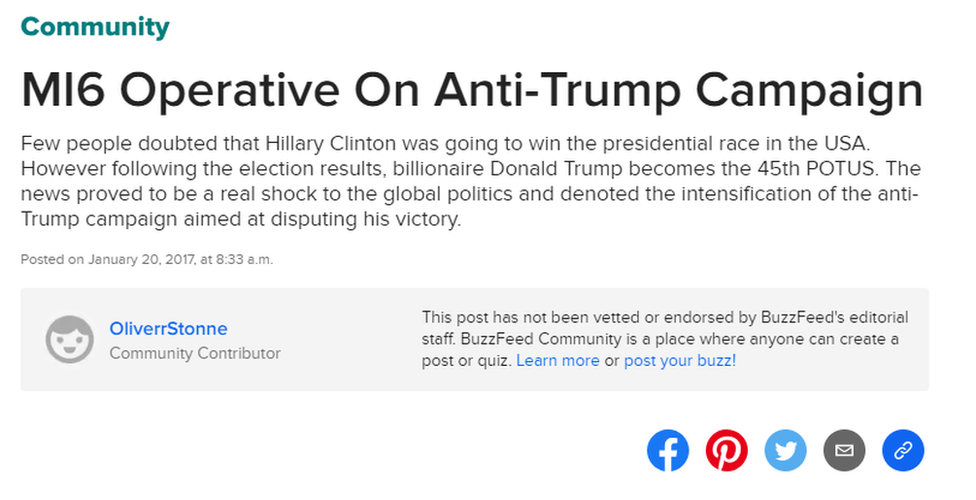
The top of the false story which claimed to be an interview with an "MI6 operative", along with the BuzzFeed disclaimer.
So why bother?
However, the story was cited elsewhere as a reference point, in an apparent attempt to add legitimacy to the conspiracy theory when it was repeated elsewhere online.
This may also help explain why those behind the disinformation network did not push harder to make the original false stories go viral.
In one instance, the fake MI6 agent interview was cited by another blog post, which described the story as a "BuzzFeed report".
The blog post went on to cite a separate genuine article on a related subject from BuzzFeed News. It made no distinction between the two stories, thus apparently trying to make the made-up Community post seem more credible than it actually was.
After BuzzFeed was contacted by the BBC, the article was removed from the Community section.
Trending also found posts and citations of that story and other fake stories translated into other languages, then posted onto foreign language blogs.
We also identified several other examples of false stories appearing on BuzzFeed Community, as well as posts on Medium, Quora and other websites.
Like the "OliverrStonne" post, few gained much attention, but several were repeated or linked to by other blogs and websites.
Orphan stories
The fabricated story was the only BuzzFeed Community post written by the "OliverrStonne" account.
Publishing single or so-called "orphan" stories on websites with accounts which subsequently become inactive was one of the general patterns of behaviour identified by researchers when they first exposed a Russia-based disinformation campaign in the summer.
The researchers at Oxford and Cardiff universities, the Atlantic Council and Graphika dubbed the earlier campaign "Secondary Infektion" after a Soviet-era disinformation plot.
The Graphika report released Tuesday, external stated: "Most of the stories seemed designed to create divisions between Western countries... This was a sophisticated and well-resourced operation."
The researchers said that, among other things, the stories aimed at undermining German and French leaders, spread rumours about the 2018 Winter Olympics in South Korea, and focused on political controversies in the United States. Several included forged documents.
The leaks
After Mr Corbyn held a press conference in November to claim the papers showed the NHS is "for sale", researchers said the pattern of behaviour by the Reddit account which initially posted the documents online resembled that of the "Secondary Infektion" accounts.
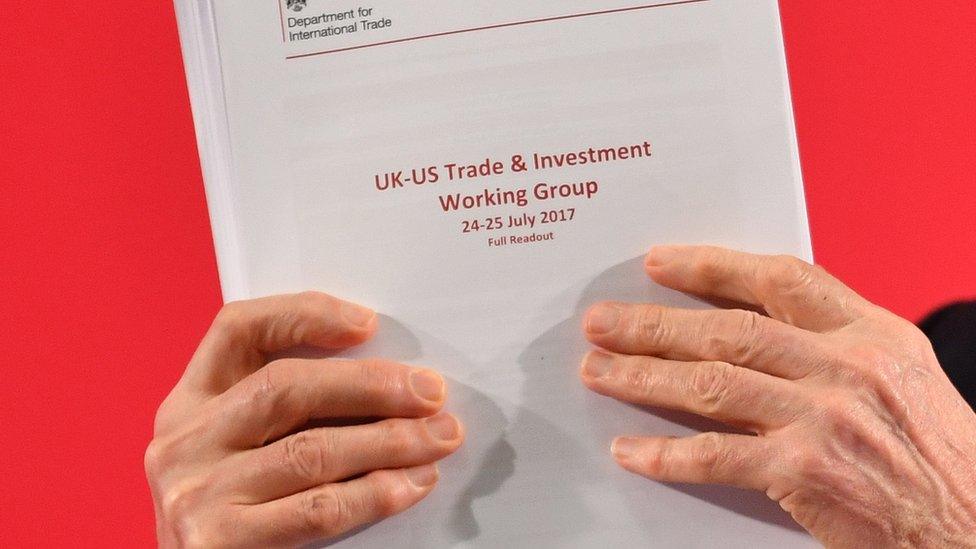
Jeremy Corbyn holds up the leaked documents at a press conference on 27 November
There is no implication that the Labour Party or Mr Corbyn knew of the origins of the network or had any contact with its members.
Labour has refused to say what its source for the documents was, and the Reddit post does not appear to be the only source of leaks about US-UK trade talks. For instance, in July of this year, the Daily Telegraph published a story based on leaks, external.
Prior to the election and in the face of criticism, the government declined to make public a report into Russian interference in British politics. Prime Minister Boris Johnson said this week that the report will be published after Parliament comes back in session.
Buzzfeed and 'fake news'
BuzzFeed News was one of the main outlets which brought attention to the issue of online disinformation or "fake news" - made-up stories going viral on social media - during the 2016 US election.
During the 2016 US election, BuzzFeed reporters uncovered a huge network based in Macedonia, external pumping out fictitious stories to try to capitalise on interest in the election campaign.
The stories were used to boost traffic to dodgy news sites and, in turn, generate money from online advertising.
In an email, a BuzzFeed spokesperson said that only a small number of its Community posts are vetted by employees, and that unvetted posts are not indexed by Google or linked to BuzzFeed's front pages or social accounts.
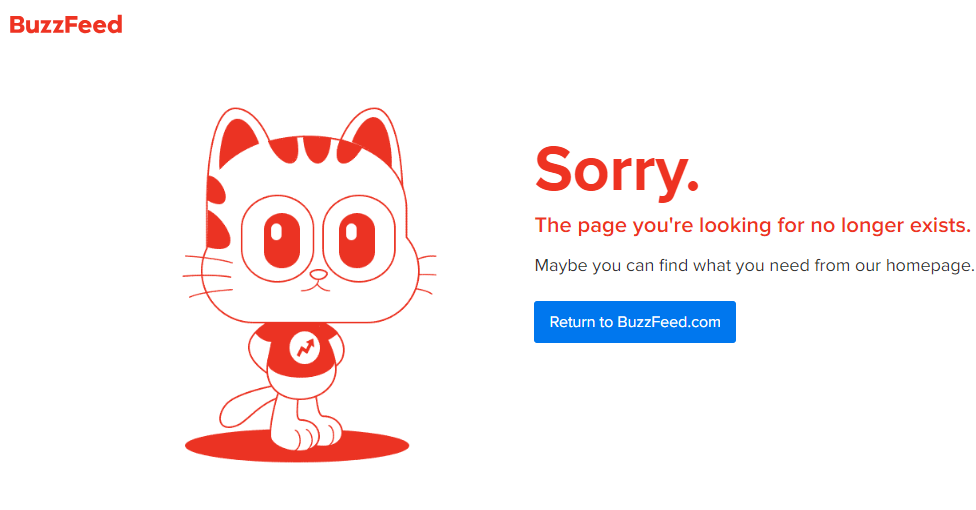
It took down the "MI6 interview" post and other posts highlighted by our investigation.
In a statement, BuzzFeed said: "While the Community section is a great place for BuzzFeed's audience to share positive, original content, we have zero tolerance for posts that violate our guidelines - which prohibit 'deceptive' and 'fraudulent' posts.
"We removed this piece as soon as it was brought to our attention, and remain vigilant about keeping BuzzFeed free of the kind of fake news and disinformation that has proliferated elsewhere on the internet."
A spokesperson for Quora said in a statement that the site had removed accounts the BBC identified.
"These profiles contributed very little content that had a very limited number of views," the statement said. "We have internal tools and conduct regular reviews with a third party security firm to monitor for this kind of activity."
Sandee Roston, a spokesperson for Medium, said the site learned about the accounts on its site via Reddit and independent reports.
"We combat malicious operators with human curation, automated filtering, and other measures which makes it more difficult for certain new or suspicious accounts to publish, which we believe will continue to reduce the incidence of these issues going forward," she said.
The BBC contacted Reddit and the Russian Foreign Ministry for comment.
Is there something we should be investigating? Email us, external
Follow BBC Trending on Twitter @BBCtrending, external, and find us on Facebook, external. All our stories are at bbc.com/trending.